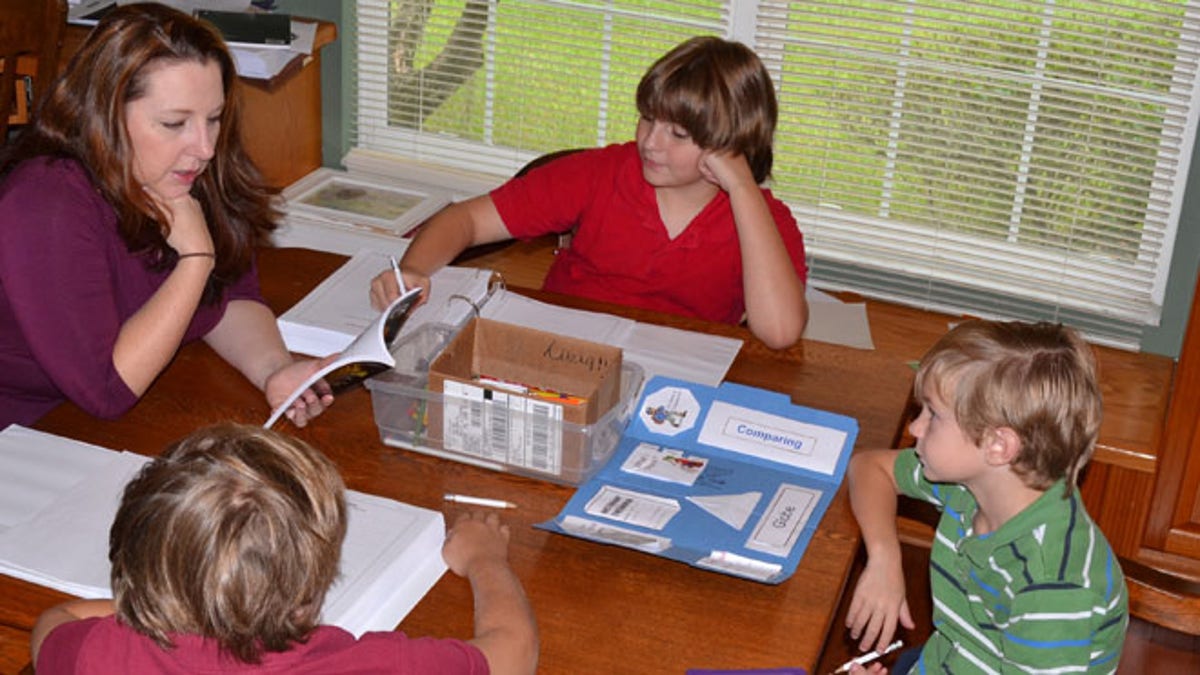
Jill Finnerty Ricardo, of Dade City, Fla., is seen teaching a lesson at home to three of her children, Rhett, 9, Roman, 11, and Reagan, 6. (FoxNews.com)
There are few things 9-year-old Rhett Ricardo relishes more than curling up on his family’s living room couch and delving into a novel, like “Twenty Thousand Leagues Under the Sea” – his imagination whirling as he reads the fantastical plot about a mysterious sea monster and a submarine, his mother says.
But Jill Finnerty Ricardo, of Dade City, Fla., who home-schools her three oldest children, has concerns about what is known as the Common Core State Standards (CCSS) – a national assessment standard adopted in 45 states that, among other objectives, seeks to balance out a perceived literature-heavy English curriculum with more non-fiction reading and writing, particularly informational text..
While the new standards, which purport to emphasize critical thinking and problem solving, are meant for public schools only, opponents say they will affect all children – including those who are home-schooled, especially when it comes to taking state standardized tests that are aligned with the Common Core.
It is up to each state whether home-schooled children must take standardized tests in grades three through eight, and once in high school. But all college-bound home-schooled students take the SAT, which is now being aligned with the new standards. The new head of the College Board, which is revamping the SAT, is David Coleman, the so-called architect of the Common Core.
“We home-school our kids to make sure we can support and encourage their individual interests, gifts and talents,” said 42-year-old Finnerty Ricardo, who holds degrees in marketing, public relations and biology.
“Rhett loves novels,” she said, calling the perceived push to scale back on fiction and increase non-fiction “short-sighted.”
“The value of using one’s imagination cannot be calculated,” she said. “Each child learns differently. Each person dreams differently.”
Common Core advocates claim misinformation, half-truths and ignorance have fueled opposition to the new standards, which were first introduced in the 2009 federal stimulus bill. A national PDK-Gallup poll, released last month, showed that two in three Americans had not heard of the Common Core.
The Hunt Institute, which supports CCSS, said the new standards were created “through a voluntary, collective effort by states” and serves as the “foundation for an education system that demands excellent teaching, high-quality professional development, rigorous curricula, and dynamic assessments.”
The educational policy group and others have addressed what they consider a widespread misperception about the Common Core: that teachers nationwide will have little or no flexibility in what they teach and how they teach it.
“Teachers and administrators, including principals and superintendents, will decide how the standards are to be taught and will establish the curriculum, just as they currently do -- allowing for continued flexibility and creativity,” the institute wrote in a briefing packet that seeks to explain the mission of CCSS.
“Teachers will continue to create lesson plans and tailor instruction to the needs of the students in their classrooms. States are currently in the process of implementing their new standards and are developing programs and materials that suit their unique needs,” the institute said.
But home-schooling groups, like the HSLDA, claim the Common Core creates a “one-size-fits-all approach to education” that rests on the “assumption that every child must learn the same things at the same speed.”
“We believe that the success of home schooling shows that the key to educational success is empowering parents and teachers, not educational bureaucrats,” the group said in a statement.
William Estrada, an attorney for the group, claims that CCSS is not a voluntary, state-led initiative, as supporters say.
“The Common Core was pushed through the Race-to-the-Top program through federal funding,” he told FoxNews.com. “The federal government said that if states adopt the Common Core, they’ll get extra points for Race-to-the-Top and billions of dollars.”
“Instead of states looking at it carefully and considering whether it’s good for them, they rushed into it because they were desperate for cash,” Estrada said.
“The primary problem with the Common Core is this national approach to education – a top-down approach saying that every kid everywhere is going to learn the same thing in the same way,” he said, adding that home-schooled children may be “disadvantaged” on standardized tests aligned with CCSS. Such tests are of critical importance to home-schooled students who are college bound because they do not have high school transcripts to submit to admissions offices.
Estrada, who was home-schooled himself, argues the Common Core “takes away one of the beauties of home schooling – and that is the ability to choose a curriculum that is best suited for your child.”
Approximately 1.5 million students are home-schooled in the United States, according to the most recent data from the Department of Education. Home school advocates, however, estimate that number to be even higher, claiming just more than 2 million children are home-educated -- which, if true, shows an increase in home schooling by as much as 75 percent since 1999.
Many educators claim the Common Core will likely have no adverse effect on home-schooled students, who, on average, already outperform their peers on standardized tests, including college-bound exams, according to some studies. Elite universities, like Stanford, have embraced home-schooled students, accepting a higher number over the last 10 years than in decades past.
While some home-school parents are wary of the Common Core, many, including Finnerty Ricardo, say they are optimistic their children will achieve high success on standardized tests despite the new standards.
“My hope is that because we have higher expectations for our kids than the Common Core, they’ll still do well on standardized tests,” she said. “We expect above and beyond what the Common Core requires.”

